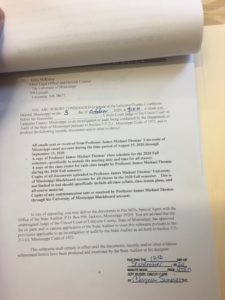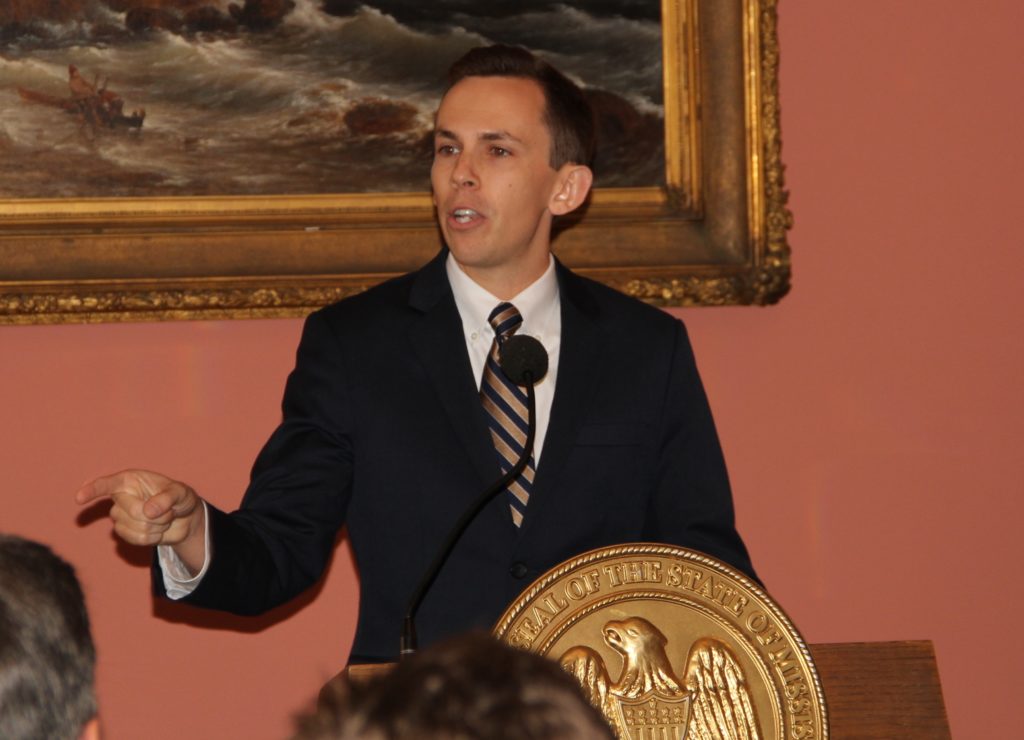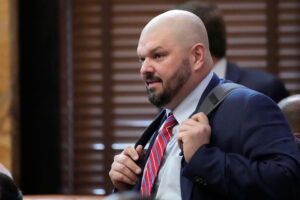OXFORD, Miss.—Lafayette County court documents show that State Auditor Shad White issued a Sept. 18 subpoena to the University of Mississippi commanding the school to produce emails that Professor James Thomas sent from or received through his university email address. The subpoena, which the Mississippi Free Press found in the courthouse today, also demands Thomas’ 2020 class schedule, rosters from every class he is teaching during the fall 2020 semester, copies of all materials Thomas has uploaded to Blackboard for those courses, and any communications to or from Thomas via Blackboard.

On Sept. 14, White wrote a letter to University of Mississippi Chancellor Glenn Boyce recommending that the university terminate and recoup two days’ pay from Thomas, an associate professor of sociology who tweeted that he was participating in a teach-in event called Scholar Strike. The state auditor contends that Thomas engaged in an employment strike, which is illegal for public employees in the Magnolia State.
More than a week has passed since White sent his letter about Thomas to Chancellor Glenn Boyce with no official response yet from the University of Mississippi.
Logan Reeves, spokesman for the Mississippi Office of The State Auditor, told the Mississippi Free Press yesterday that he was unaware of a formal response to date from UM, but added, “Our position is that the law is very clear what must take place next.”
For Thomas, this means a court must determine whether or not he participated in a strike and acted according to state law. Under the statute, a legal finding that Thomas did participate in a strike as defined by state law would mean his termination.
‘That Sort of Behavior, That Strike, Is Illegal in Mississippi’
White, 35, began his investigation after seeing Thomas, 38, tweet that he would be participating in Scholar Strike.
“I’ve emailed my classes to let them know I won’t be available the next two days,” the professor tweeted on Sept. 7, which was Labor Day. “I’ve pointed them toward @ScholarStrike resources to understand why so many of us are joining in this national call to action.”
Mississippi law targets employment strikes with this language: “If the court, after a hearing on notice, determines that a certified teacher has violated subsection (3) of this section, it shall order the termination of his or her employment by the public school district. No person knowingly violating the provision of said subsection may, subsequent to such violation, be employed or reemployed as a teacher by any public school district in the state unless the court first finds a public necessity therefor.”

White believes Thomas violated that statute. “The professor struck two days last week. In an email to students he called it a scholar strike, and he called it a work stoppage,” White said about Thomas’ Scholar Strike tweets during a Sept. 21 podcast interview with Mississippi Today. “He outlined in pretty good detail the exact work-related tasks he would not be performing. He was not going to be responding to emails, he was not going to be answering Zoom calls, he was not going to be holding office hours, he was not going to be teaching his classes, and he had three classes on those two days to teach.
“So that sort of behavior, that strike, is illegal in Mississippi under the no-strike law, and the no-strike law states that there are some pretty plain consequences for what happens when somebody does that.”
Those consequences, White says about the statute, include termination and repaying money the State paid for those days.
Law Response to ‘Wildcat’ Teacher Strikes for Pay in 1985
The central question in this case, poised for litigation, seems to be whether or not Thomas was participating in a “strike” as the language of Mississippi law defines it. ACLU Mississippi Legal Director Joshua Tom told the Mississippi Free Press today that he did not interpret the statute in the same way. The Mississippi Legislature passed the statute that the state auditor cited in his letter following wildcat strikes by Mississippi public-school teachers in 1985.
Those strikes, the latest in Mississippi history, came in the early months of 1985.
More than a third of Mississippi’s 28,000 public-school teachers organized to seek substantial pay raises, which they eventually received. At the time, the U.S. Department of Education rated Mississippi public schools the poorest in the nation 15 years after the U.S. Supreme Court forced the schools to finally integrate, followed by the flight of thousands of white families into private academies, drawing resources out of the public system.
The New York Times reported then that the strike started in several rural counties in southern Mississippi. At the time, the average public-school salary for Mississippi’s 26,000 teachers was $15,971.
As a result of the strikes, Mississippi teachers were awarded a raise of $4,400 each, broken into an initial pay increase of $2,400 in 1986, followed by a $1,000 per year salary increase for two additional years.
At the time, the Mississippi Association of Educators, which had 13,000 members as the largest teachers’ union in the state, had endorsed the walkouts, which ultimately proved effective. The State of Mississippi adopted the statute to prevent a recurrence of the workers’ rights organizations that roiled the state in the mid-1980s, solidifying Mississippi as a staunchly anti-union state for decades to come.
Striking for Racial Justice: ‘The Statute Doesn’t Apply to That’
“It’s not clear to me that this statute applies to Professor Thomas,” Tom emphasized.
The ACLU of Mississippi legal director noted that the law prohibits teachers in public-school districts from striking “for the purpose of inducing, influencing or coercing a change in the conditions, compensation, rights, privileges or obligations of public employment.”

Changing employment conditions, or getting a pay increase as the teacher wildcat strike demanded, were not motivations behind Scholar Strike, designed as an academic teach-in over racism, police violence and social justice. The American Sociological Society, to which Thomas belongs, had encouraged its member academics to participate as a teaching exercise.
Tom added that a subsection of the statute clarifies that public-school teachers or related organizations shall not “encourage or participate in any strike against a public school district, the State of Mississippi or any agency thereof.”
“What the professor did: He took two days off of work to bring attention to racial justice, and so the statute as I read it, doesn’t even apply to him,” Tom said.
“From what I can tell of the statute, and based on any court interpretations of the statute, which there are basically none that I can find, this statute only applies if you’re striking in order to change the conditions of your employment, or to strike against the school,” Tom continued.
“So striking in order to raise attention to racial-justice issues, and then tweeting about that’s why you’re doing it, is irrelevant because the statute doesn’t apply to that.”
‘We Urge That You Immediately and Publicly Express Support’
In addition to the pressure from state officials, Thomas is facing renewed scrutiny online, including threats against his life just as he experienced in 2019 after unpopular tweets during the Brett Kavanaugh hearings. On the morning of Sept., 18, Thomas tweeted, “If the university cannot find the courage necessary to protect its faculty’s academic freedom, can it find the conviction to denounce death threats made toward its faculty?”

Accompanying his inquiry were two photos of threats Thomas received online. One person tweeted, “Hang him,” while another stated, “Execute the anti American terrorist.”
Despite the silence from UM administrators about the threats toward one of their tenured professors, Thomas is receiving national public support from fellow academics, with several publicly coming to his defense. Hundreds of people in academic communities across the nation have voiced support for the embattled professor.
On Monday, a group of 41 scholars released a letter sent to UM Provost Noel Wilkin demanding that the university stand in solidarity with Thomas. “We, the undersigned members of the professoriate in Mississippi and beyond, urge that you immediately and publicly express support for the besieged faculty member, J. M. Thomas,” the letter began.
“Dr. Thomas’ participation in ScholarStrike constituted, as he has suggested, his teaching activity on September 8-9, 2020, declaring his support of humanistic values that are at the heart of the academic enterprise. Rather than being threatened by forces of the State for his action, he should be honored for helping to advance the values espoused in the University’s own Mission Statement, including enriching opportunities outside the classroom and a sense of global responsibility.”










